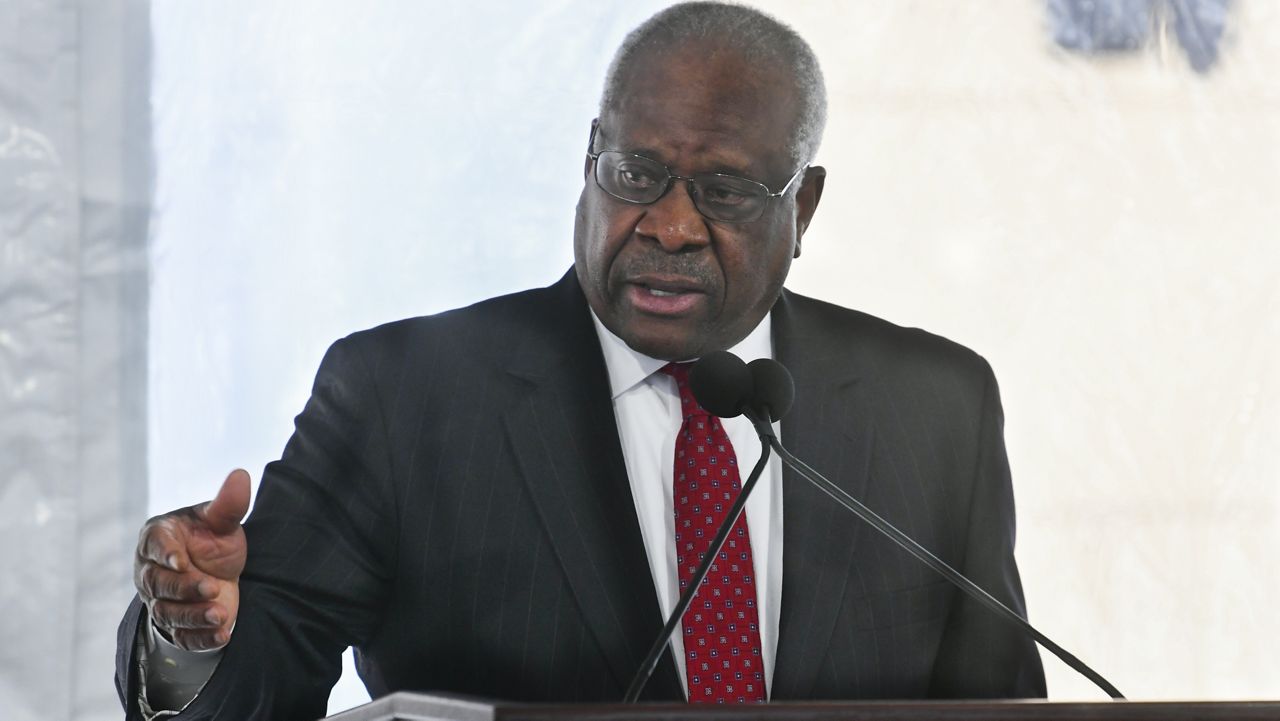A pair of Senate Democrats is asking Attorney General Merrick Garland to appoint a special counsel to investigate Supreme Court Justice Clarence Thomas.
What You Need To Know
- Sens. Sheldon Whitehouse, D-R.I., and Ron Wyden, D-Ore., sent a letter last week to Attorney General Merrick Garland requesting he appoint a special counsel to investigate Supreme Court Justice Clarence Thomas
- The two Democratic senators want an independent prosecutor be appointed to examine whether Thomas and benefactors who gave him undisclosed gifts violated ethics, false statement and tax laws
- A Finance Committee investigation last year found that Thomas failed to repay the principal of a $267,000 loan from Anthony Welters, a close friend and health care executive, to buy a luxury motorcoach
- Thomas has come under fire for the motorcoach deal as well as allegedly accepting and not disclosing dozens of luxury vacations, private school tuition for his great nephew, free rent for his mother and other gifts from wealthy executives over his three decades on the high court
In a letter last week, Sens. Sheldon Whitehouse, D-R.I., and Ron Wyden, D-Ore., requested an independent prosecutor be appointed to examine whether Thomas and benefactors who gave him undisclosed gifts violated ethics, false statement and tax laws.
“The evidence assembled thus far plainly suggests that Justice Thomas has committed numerous willful violations of federal ethics and false-statement laws and raises significant questions about whether he and his wealthy benefactors have complied with their federal tax obligations,” Whitehouse and Wyden wrote.
Whitehouse is the chairman of Senate Judiciary Subcommittee on Federal Courts. Wyden is the chairman of the Finance Committee.
A Finance Committee investigation last year found that Thomas failed to repay the principal of a $267,000 loan from Anthony Welters, a close friend and health care executive, to buy a luxury motorcoach. Thomas did not disclose the forgiven debt on his ethics filings, violating the Ethics in Government Act, and it’s not clear whether he properly reported it on his tax returns, the senators said. Thomas has not provided Senate Democrats with satisfactory answers to their questions, they added.
An attorney for Thomas, Elliot S. Berke, wrote in a brief letter to Wyden and Whitehouse in January that “the terms of the agreement were satisfied in full” but did not elaborate. Thomas also “fully complied with all judicial disclosure rules on this matter,” Berke added.
The Finance Committee said it only found evidence Thomas made interest payments before the loan was forgiven.
“No government official should be above the law,” Whitehouse and Wyden wrote in their letter. “Supreme Court justices are properly expected to obey laws designed to prevent conflicts of interest and the appearance of impropriety and to comply with the federal tax code.”
Neither the Supreme Court nor Berke immediately responded to emails seeking comment on Thomas’ behalf. The Justice Department declined to comment.
Whitehouse and Wyden also want a special counsel to investigate other undisclosed gifts given to Thomas by billionaire benefactors and determine whether any loans or gifts to Thomas “were provided pursuant to a coordinated enterprise or plan.”
Thomas has come under fire for the motorcoach deal as well as allegedly accepting and not disclosing dozens of luxury vacations, private school tuition for his great nephew, free rent for his mother and other gifts from wealthy executives over his three decades on the high court.
“The furtive nature of the payments raises further questions about how many such payments were orchestrated, whether legitimate services were actually rendered, and whether such payments required additional reporting by Justice Thomas,” Whitehouse and Wyden wrote. “We have not yet adequately been able to investigate the extent to which any or all these undisclosed gifts were part of a coordinated gifts program to reward recipient justices.”
Thomas has not responded publicly to each allegation but previously defended some trips paid for by billionaire conservative donor Harlan Crow as “personal hospitality from close personal friends” who had no business before the court. Thomas said he had sought guidance from colleagues and other federal judges and was told he did not have to disclose the travel.
The Supreme Court has since implemented new ethics rules. Critics have argued, however, they lack an enforcement mechanism.
Last month, Thomas belatedly reported that in 2019 Crow paid for a hotel room in Bali, Indonesia, and food and lodging at a private club in Sonoma County, California.
Editor's note: This article was updated to say the Justice Department declined to comment.



